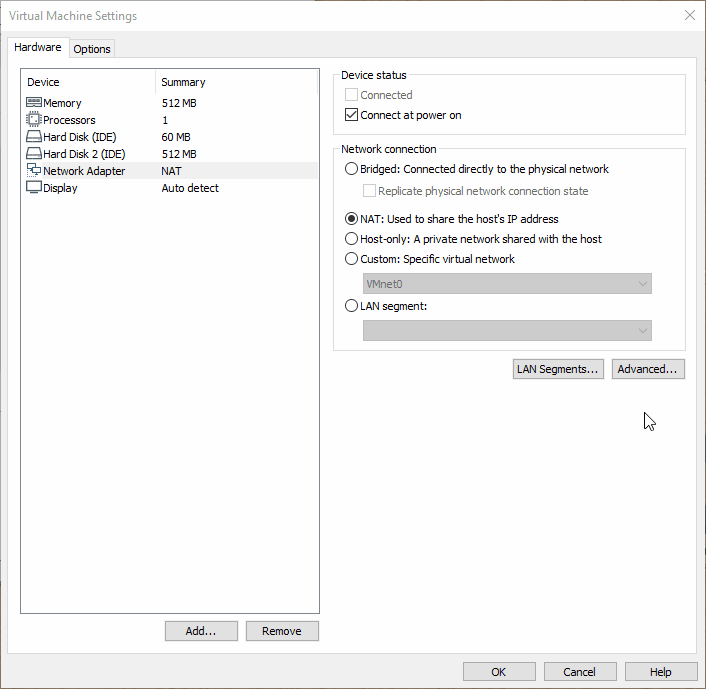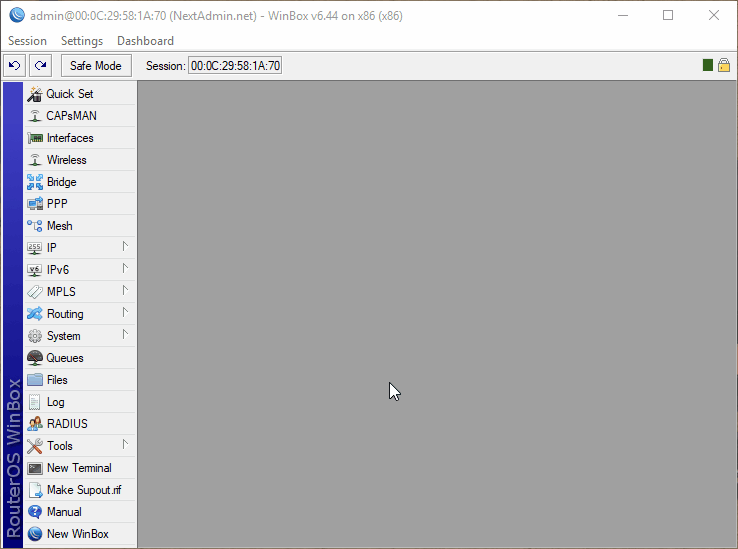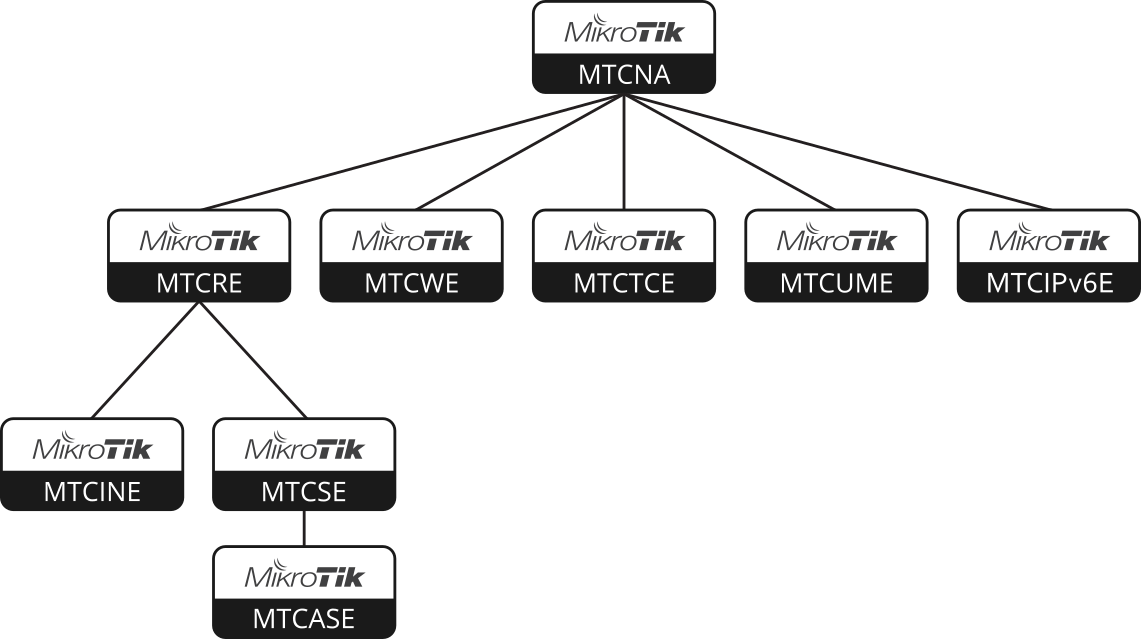دانلود MikroTik RouterOS 6.44 Level 6 کرک شده
در این پست آخرین نسخه MikroTik RouterOS یعنی ورژن ۶٫۴۴ که در تاریخ ۲۰۱۹-Feb-25 منتشر شده است را قرار می دهیم. این نسخه دارای License سطح ۶ می باشد. تغییرات صورت گرفته در این نسخه زیاد می باشد و به دلایل امنیتی شدیدا توصیه می شود بروزرسانی کنید، لیست تغییرات در آخر پست قرار گرفته است.

لینک دانلود MikroTik RouterOS 6.44 Level 6
لینک دانلود Winbox version 3.18
نکته ۱: برای استفاده از این ماشین مجازی (VM) ابتدا فایل را از حالت فشرده خارج نمایید و سپس فایل OVA Template مربوط به VM را به نرم افزار مجازی ساز معرفی – Import کنید. مخصوص ماشین مجازی VMware
نکته ۲: برای این که مشکل MAC Address پیش نیاید پیشنهاد می شود در تنظیمات – Setting کارت شبکه MAC Address را با زدن دکمه Generate تغییر دهید.

نکته ۳: در صورتیکه پس از اجرای VM، از شما پرسیده شد که این ماشین رو کپی – Copy کرده اید یا انتقال – Move داده اید، که در پاسخ بگویید که کپی – Copy شده است.
نکته ۴: برای بروزرسانی مک آدرس میکروتیک هم میتوانید از طریق Winbox به شکل زیر عمل کنید

میکروتیک (به انگلیسی: MikroTik) نام شرکتی در لتونی است که تجهیزات شبکه رایانهای و مخابرات بیسیم تولید میکند. مهمترین محصول این شرکت سیستمعامل میکروتیک است. سیستمعامل میکروتیک مسیریابی است که با استفاده از هسته لینوکس ساخته شده است. سیستمعامل میکروتیک علاوهبر قابلیت نصب بر روی رایانههای خانگی، به صورت بسته نرمافزاری-سختافزاری نیز ارائه شده است. سیستمعامل میکروتیک در سال ۱۹۹۵ میلادی توسط دو دانشجوی دانشگاه امایتی آمریکا به وسیله نگارشی از سیستمعامل لینوکس بنیان گذاشته شد. همزمان با شکلگیری استانداردهای ۸۰۲٫۱۱ و توسعه سختافزاری این سیستمعامل قابلیت بیسیم نیز به آن افزوده شد.
این دستگاه جزو مسیریابهای قوی ارائه شده و همرده مسیریابهای شرکت سیسکو میباشد و دارای قابلیتهای منحصر به فرد میباشد.
از قابلیتهای میکروتیک میتوان به موارد زیر اشاره کرد:
مسیریابی (به انگلیسی: routing)
دیوار آتش (به انگلیسی: firewall)
بیسیم به (به انگلیسی: wireless)
پروتکل پیکربندی پویای میزبان (به انگلیسی: Dhcp server)
برگردان نشانی شبکه و میزبان نماینده (به انگلیسی: nat and proxy server)
پشتیبانی از آیپی نسخه ۶ (به انگلیسی: IPv6 support)
مدیریت کاربر (به انگلیسی: user managment)
تعادلرسانی بارگذاری (به انگلیسی: load balancing)
صفحه مدارهای مسیریابهای میکروتیک به طور کلی به دوسته مسیریابها و بیسیمها تقسیم میشوند البته دستگاههای بیسیم هم توانایی مسیریابی را دارند اما عمده استفاده آنها در صنعت بیسیم میباشد.
RouterOS
محصول اصلی میکروتیک سیستم عامل مبتنی بر لینوکس است که به عنوان MikroTik RouterOS شناخته میشود. با نصب بر روی سختافزار اختصاصی همان شرکت (RouterBOARD) و یا بر روی رایانههای استاندارد مبتنی بر x86، سختافزار را به یک مسیریاب شبکه تبدیل میکند و بسیاری از ویژگیهای اضافه مختلف را به اجرا درمیآورد؛ مانند دیواره آتش، خدمات دهنده و سرویس گیرنده شبکه خصوصی مجازی، شکل دهنده و ارتقا دهنده کیفیت خدمات پهنای باند. همچنین ویژگی نقطه دسترسی (Access Point) و دیگر ویژگیها را در شبکههای بیسیم بازی میکند. به منظور ارتقای سطح عملکرد این سیستم عامل باید مجوز (لایسنس) هر ویژگی را دریافت کرد. برنامه کاربردی این شرکت برای سیستم عامل مایکروسافت ویندوز، Winbox نام دارد؛ که یک رابط گرافیکی کاربر برای پیکربندی مسیریاب و نظارت بر کارکرد آن فراهم میکند. درعین حال RouterOS امکان دسترسی را از طریق FTP، telnet، و SSH مهیا میکند. به علاوه، برای مدیریت و نظارت یک برنامه کاربردی رابط (API) جهت دسترسی مستقیم از طریق برنامههای کاربردی نیز وجود دارد
ویژگیهای RouterOS
RouterOS از بسیاری برنامههای کاربردی که توسط ارائه دهندگان خدمات اینترنت استفاده شده میشود پشتیبانی میکند. به عنوان مثال OSPF و سوئیچینگ برچسب چندقرارداری (VPLS / MPLS). پشتیبانی محصول توسط میکروتیک از طریق انجمن و ویکی انجام میگیرد. بدین وسیله نمونههایی از تنظیمات حرفهای و کلی ارائه میشود. RouterOS از IPv4 و | پروتکل_اینترنت_نسخه_۴ (IPv4) را و همچنین پروتکل_اینترنت_نسخه_۶ (از IPv6).
پشتیانی رابطهای شبکه در این نرمافزار تقریباً شامل تمام رابطهای شبکه (NIC) که هسته لینوکس پشتیبانی میکند، بجز رابط بیسیم؛ که در این بین رابطهای ساخت Atheros و PRISM مستثنی هستند.
سیستمعامل میکروتیک
سیستمعامل میکروتیک در واقع همان هسته مرکزی دستگاههای میکروتیک اند و مشابه سیستمعامل در روترهای سیسکو عمل میکنند. در حال حاضر جدیدترین سیستمعاملی که توسط شرکت میکروتیک ارائه شده همین نسخه موجود در سایت میباشد که نسخه پایدار و قابل اطمینان این سیستمعامل است، البته نسخه آزمایشی آن هم در سایت خود میکروتیک برای علاقهمندان ارائه شده است.
مجوز استفاده
میکروتیک برای کاهش هزینهها از مجوزهای (به انگلیسی: License) مختلفی در بکارگیری دستگاهها استفاده کردهاست آنچه امروز قابل ارائه است مجوزهای سطح سه، چهار، پنج و شش است. هرگاه شما دستگاه میکروتیک را خریداری میکنید بر روی آن دستگاه شما مجوز استفاده با یکی از سطوح سه، چهار، پنج و یا ۶ را دارید. هر مجوز امکان مدیریت کاربران بیشتری را در شبکه به شما میدهد. بالاترین سطح مجوز که سطح شش است به شما امکان مدیریت در تمامی امکانات و کاربران نامحدود را میدهد.

view outline)
view outline)
view outline)
view outline)
view outline)
view outline)
view outline)
view outline)
view outline)
What’s new in 6.44 (2019-Feb-25 14:11):
MAJOR CHANGES IN v6.44:
———————-
!) cloud – added command /system backup cloud” for backup storing on cloud (CLI only);
!) ipsec – added new identity” menu with common peer distinguishers;
!) ipsec – removed main-l2tp” exchange-mode, it is the same as main” exchange-mode;
!) ipsec – removed users” menu, XAuth user configuration is now handled by identity” menu;
!) radius – initial implementation of RadSec (RADIUS communication over TLS);
!) speedtest – added /tool speed-test” for ping latency, jitter, loss and TCP and UDP download, upload speed measurements (CLI only);
———————-
Changes in this release:
*) bgp – properly update keepalive time after peer restart;
*) bridge – added option to monitor fast-forward status;
*) bridge – count routed FastPath packets between bridge ports under FastPath bridge statistics;
*) bridge – disable fast-forward when using SlowPath features;
*) bridge – fixed BOOTP packet forwarding when DHCP Snooping is enabled;
*) bridge – fixed DHCP Option 82 parsing when using DHCP Snooping;
*) bridge – fixed log message when hardware offloading is being enabled;
*) bridge – fixed packet forwarding when changing MSTI VLAN mappings;
*) bridge – fixed packet forwarding with enabled DHCP Snooping and Option 82;
*) bridge – fixed possible memory leak when using MSTP;
*) bridge – fixed system’s identity change when DHCP Snooping is enabled (introduced in v6.43);
*) bridge – improved packet handling when hardware offloading is being disabled;
*) bridge – improved packet processing when bridge port changes states;
*) btest – added multithreading support for both UDP and TCP tests;
*) btest – added warning message when CPU load exceeds 90% (CLI only);
*) capsman – always accept connections from loopback address;
*) certificate – added support for multiple Subject Alt. Names”;
*) certificate – enabled RC2 cipher to allow P12 certificate decryption;
*) certificate – fixed certificate signing by SCEP client if multiple CA certificates are provided;
*) certificate – show digest algorithm used in signature;
*) chr – assign interface names based on underlying PCI device order on KVM;
*) chr – distribute NIC queue IRQ’s evenly across all CPUs;
*) chr – fixed IRQ balancing when using more than 32 CPUs;
*) chr – improved system stability when insufficient resources are allocated to the guest;
*) cloud – added ddns-update-interval” parameter;
*) cloud – do not reuse old UDP socket if routing changes are detected;
*) cloud – ignore force-update” command if DDNS is disabled;
*) cloud – improved DDNS service disabling;
*) cloud – made address updating faster when new public address detected;
*) conntrack – added new loose-tcp-tracking” parameter (equivalent to nf_conntrack_tcp_loose” in netfilter);
*) console – renamed IP protocol 41 to ipv6-encap”;
*) console – updated copyright notice;
*) crs317 – fixed packet forwarding when LACP is used with hw=no;
*) crs3xx – fixed packet forwarding through SFP+ ports when using 100Mbps link speed;
*) crs3xx – improved fan control stability;
*) defconf – fixed configuration not generating properly on upgrade;
*) defconf – fixed default configuration loading on RB4011iGS+5HacQ2HnD-IN;
*) defconf – fixed IPv6 link-local address range in firewall rules;
*) dhcp – added allow-dual-stack-queue” setting for IPv4/IPv6 DHCP servers to control dynamic lease/binding behaviour;
*) dhcp – properly load DHCP configuration if options are configured;
*) dhcpv4-server – added parent-queue” parameter (CLI only);
*) dhcpv4-server – added User-Name” attribute to RADIUS accounting messages;
*) dhcpv4-server – fixed service becoming unresponsive after interface leaves and enters the same bridge;
*) dhcpv4-server – use ARP for conflict detection;
*) dhcpv6-client – use default route distance also for unreachable route added by DHCPv6 client;
*) dhcpv6-server – allow to add DHCPv6 server with pool that does not exist;
*) dhcpv6-server – fixed missing gateway for binding’s network if RADIUS authentication was used;
*) dhcpv6-server – improved DHCPv6 server stability when using print” command;
*) dhcpv6-server – show client-address” parameter for bindings;
*) discovery – detect proper slave interface on bounded interfaces;
*) discovery – fixed malformed neighbor information for routers that has incomplete IPv6 configuration;
*) discovery – send master port in interface-name” parameter;
*) discovery – show neighbors on actual bridge port instead of bridge itself for LLDP;
*) e-mail – added info log message when e-mail is sent successfully;
*) ethernet – added tx-rx-1024-max” counter to Ethernet stats;
*) ethernet – fixed IPv4 and IPv6 packet forwarding on IPQ4018 devices;
*) ethernet – fixed linking issues on wAP ac, RB750Gr2 and Metal 52 ac (introduced in v6.43rc52);
*) ethernet – fixed packet forwarding when SFP interface is disabled on hEX S;
*) ethernet – fixed VLAN1 forwarding on RB1100AHx4 and RB4011 devices;
*) ethernet – improved per core ethernet traffic classificator on mmips devices;
*) export – fixed silent-boot” compact export;
*) fetch – added http-header-field” parameter;
*) fetch – added option to specify multiple headers under http-header-field”, including content type;
*) fetch – fixed without-paging” option;
*) fetch – improved file downloading to slow memory;
*) fetch – improved stability when using HTTP mode;
*) fetch – removed http-content-type” parameter;
*) gps – increase precision for dd format;
*) gps – moved coordinate-format” from monitor” command to set” parameter;
*) health – improved fan control stability on CRS328-24P-4S+RM;
*) hotspot – added https-redirect” under server profiles;
*) hotspot – added per-user NAT rule generation based on incoming-filter” and outgoing-filter” parameters;
*) ike1 – do not allow using RSA-key and RSA-signature authentication methods simultaneously on single peer;
*) ike1 – fixed memory leak;
*) ike2 – added option to specify certificate chain;
*) ike2 – added peer identity validation for RSA auth (disabled after upgrade);
*) ike2 – allow to match responder peer by my-id=fqdn” field;
*) ike2 – fixed local address lookup when initiating new connection;
*) ike2 – improved subsequent phase 2 initialization when no childs exist;
*) ike2 – properly handle certificates with empty Subject”;
*) ike2 – retry RSA signature validation with deduced digest from certificate;
*) ike2 – send split networks over DHCP (option 249) to Windows initiators if DHCP Inform is received;
*) ike2 – show weak pre-shared-key warning;
*) interface – added pwr-line” interface support (more information will follow in next newsletter);
*) ipsec – added account log message when user is successfully authenticated;
*) ipsec – added basic pre-shared-key strength checks;
*) ipsec – added new remote-id” peer matcher;
*) ipsec – allow to specify single address instead of IP pool under mode-config”;
*) ipsec – fixed active connection killing when changing peer configuration;
*) ipsec – fixed all policies not getting installed after startup (introduced in v6.43.8);
*) ipsec – fixed stability issues after changing peer configuration (introduced in v6.43);
*) ipsec – hide empty prefixes on peer” menu;
*) ipsec – improved invalid policy handling when a valid policy is uninstalled;
*) ipsec – made dynamic src-nat” rule more specific;
*) ipsec – made peers autosort themselves based on reachability status;
*) ipsec – moved profile” menu outside peer” menu;
*) ipsec – properly detect AES-NI extension as hardware AEAD;
*) ipsec – removed limitation that allowed only single auth-method” with the same exchange-mode” as responder;
*) ipsec – require write policy for key generation;
*) kidcontrol – added IPv6 support;
*) kidcontrol – added reset-counters” command for device” menu (CLI only);
*) kidcontrol – added statistics web interface for kids (http://router.lan/kid-control);
*) kidcontrol – added tur-fri”, tur-mon”, tur-sat”, tur-sun”, tur-thu”, tur-tue”, tur-wed” parameters;
*) kidcontrol – dynamically discover devices from DNS activity;
*) kidcontrol – fixed validation checks for time intervals;
*) kidcontrol – properly detect time zone changes;
*) kidcontrol – use /128” prefix-length for IPv6 addresses;
*) l2tp – fixed IPsec secret not being updated when ipsec-secret” is changed under L2TP client configuration;
*) lcd – made pin” parameter sensitive;
*) led – fixed default LED configuration for RBSXTsq-60ad;
*) led – fixed default LED configuration for wAP 60G AP devices;
*) led – fixed PWR-LINE AP Ethernet LED polarity (/system routerboard upgrade” required);
*) lldp – fixed missing capabilities fields on some devices;
*) lte – added additional ID support for Novatel USB730L modem;
*) lte – added cell-monitor” command for R11e-LTE international modem (CLI only);
*) lte – added ecno” field for info” command;
*) lte – added firmware-upgrade” command for R11e-LTE international modems (CLI only);
*) lte – added initial support for multiple APN for R11e-4G (new modem firmware required);
*) lte – added initial support for Telit LN940;
*) lte – added multiple APN support for R11e-4G;
*) lte – added option to lock the LTE operator;
*) lte – added support for JioFi JMR1040 modem;
*) lte – fixed connection issue when LTE modem was de-registered from network for more than 1 minute;
*) lte – fixed DHCP IP acquire (introduced in v6.43.7);
*) lte – fixed DHCP relay packet forwarding when in passthrough mode;
*) lte – fixed IPv6 activation for R11e-LTE-US modems;
*) lte – fixed Jaton/SQN modems preventing router from booting properly;
*) lte – fixed LTE interface not working properly after reboot on RBSXTLTE3-7;
*) lte – fixed missing running (R) flag for Jaton LTE modems;
*) lte – fixed passthrough DHCP address forward when other address is acquired from operator;
*) lte – fixed reported rsrq” precision (introduced in v6.43.8);
*) lte – improved compatibility for Alt38xx modems;
*) lte – improved SIM7600 initialization after reset;
*) lte – improved SimCom 7100e support;
*) lte – query cfun” on initialization;
*) lte – require write policy for at-chat;
*) lte – update firmware version information after R11e-LTE/R11e-4G firmware upgrade;
*) netinstall – do not show kernel failure critical messages in the log after fresh install;
*) ntp-client – fixed dst-active” and gmt-offset” being updated after synchronization with server;
*) port – improved remote-serial” TCP performance in RAW mode;
*) ppp – added at-chat” command;
*) ppp – fixed dynamic route creation towards VPN server when add-default-route” is used;
*) profiler – classify kernel crypto processing as encrypting”;
*) profile – removed obsolete file-name” parameter;
*) proxy – removed port list size limit;
*) radius – implemented Proxy-State attribute handling in CoA and disconnect requests;
*) rb3011 – implemented multiple engine IPsec hardware acceleration support;
*) rb4011 – fixed SFP+ interface full duplex and speed parameter behavior;
*) rb4011 – improved SFP+ interface linking to 1Gbps;
*) rbm33g – improved stability when used with some USB devices;
*) romon – improved reliability when processing RoMON packets on CHR;
*) routerboard – removed RB” prefix from PWR-LINE AP devices;
*) routerboard – require at least 10 second interval between reformat-hold-button” and max-reformat-hold-button”;
*) smb – added commenting option for SMB users (CLI only);
*) smb – fixed macOS clients not showing share contents;
*) smb – fixed Windows 10 clients not able to establish connection to share;
*) sniffer – save packet capture in 802.11” type when sniffing on w60g interface in sniff” mode;
*) snmp – added dot1qPortVlanTable” and dot1dBasePortTable” OIDs;
*) snmp – changed fan speed value type to Gauge32;
*) snmp – fixed rsrq” reported precision;
*) snmp – fixed w60g station table;
*) snmp – removed rx-sector” (Wl60gRxSector”) value;
*) snmp – report bridge ifSpeed as 0”;
*) snmp – report ifSpeed 0 for sub-layer interfaces;
*) ssh – added allow-none-crypto” parameter to disable none” encryption usage (CLI only);
*) ssh – added error log message when key exchange fails;
*) ssh – close active SSH connections before IPsec connections on shutdown;
*) ssh – fixed public key format compatibility with RFC4716;
*) supout – fixed poe-out” output not showing all interfaces;
*) supout – fixed Profile output on single core devices;
*) switch – added comment field to switch ACL rules;
*) switch – fixed ACL rules on IPQ4018 devices;
*) system – accept only valid path for log-file” parameter in port” menu;
*) system – removed obsolete /driver” command;
*) tr069-client – added check-certificate” parameter to allow communication without certificates;
*) tr069-client – added connection-request-port” parameter (CLI only);
*) tr069-client – added support for InformParameter object;
*) tr069-client – fixed certificate verification for certificates with IP address;
*) tr069-client – fixed HTTP cookie getting duplicated with the same key;
*) tr069-client – increased reported rsrq” precision;
*) traceroute – improved stability when sending large ping amounts;
*) traffic-flow – reduced minimal value of active-flow-timeout” parameter to 1s;
*) tunnel – properly clear dynamic IPsec configuration when removing/disabling EoIP with DNS as remote-address”;
*) upgrade – made security package depend on DHCP package;
*) usb – improved power-reset error message when no bus specified on CCR1072-8G-1S+;
*) usb – improved USB device powering on startup for hAP ac^2 devices;
*) usb – increased default power-reset timeout to 5 seconds;
*) userman – added first and last name fields for signup form;
درباره این سایت